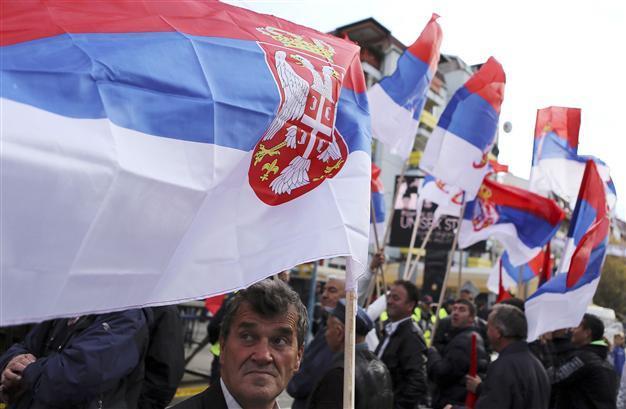Kosovo Serbs return to polls in flashpoint town
KOSOVSKA MITROVICA - Agence France-Presse

People wave Serbian flags during a rally in the ethnically-divided town of Mitrovica, November 15, 2013. REUTERS photo
Polls opened in Kosovo's flashpoint town on Sunday where ethnic Serbs were set to cast ballots under heavy security after previous elections were annulled due to violence.
Voting for local mayors and councillors will be repeated at three polling stations in the Serb-populated part of the ethnically divided town Kosovska Mitrovica after masked Serbian extremists destroyed ballot boxes during the previous election on November 3. The vote is seen as a crucial bellwether of ties between Serbia and Kosovo and authorities on both sides hoped that a peaceful and successful election would boost their hopes of joining the European Union.
Police and NATO-led peacekeepers in Kosovo (KFOR) were deployed in numbers close to polling stations on Sunday.
KFOR and an EU mission in the country had vowed "robust security measures in order to ensure ... the voting process takes place in a peaceful and orderly manner".
And Zeljko Bojic, a Serb commander of Kosovo police warned that "any provocation or intimidation will not be tolerated".
Aside from the attack by masked Serb extremists, the November 3 vote was also marred by intimidation that drew condemnation from the international community.
Serbia rejects Kosovo's independence but has urged the ethnic Serb community there to vote and have their say in Pristina-run institutions.
The election was part of an historic deal brokered by the EU in April to normalise ties between Serbia and Kosovo since the breakaway territory proclaimed independence in 2008.
Some 120,000 ethnic Serbs live in Kosovo, whose 1.8 million population is mainly Albanian.
But the 40,000 or so Serbs in the north recognise neither Kosovo's independence nor authorities in Pristina since the end of the 1998-1999 war between Serbia and Kosovo.
However, speaking at a rally in Kosovska Mitrovica, Serbian Prime Minister Ivica Dacic appealed for a high turnout, after a mere 10 percent voted last time.
"Serbia cannot help you today with guns and tanks... because we cannot win that battle. Today we can win only with strong political connections and smart decisions, therefore your future depends on you," Dacic said.
"I voted for future, for youth," Radunka Milovanovic, 71, told AFP after she cast her ballot on Sunday.
"I did not vote last time, but now I will as I feel ashamed and disgusted" with the violence on November 3, said a young teacher who gave his name as Marko but declined to give his last name.
A 45-year-old woman said she would cast her ballot. She said the Serbs "support neither Washington nor Brussels", but wondered, "what will happen if we lose Belgrade's support".
Oliver Ivanovic, one of the Serb mayoral candidates, told AFP that he hoped "that the voters will understand the importance of these elections and come out to the polls".
Many Serbs have expressed concern that voting in the election will hand legitimacy to the Kosovo government.
Political analyst Bosko Jaksic said Belgrade had failed to fully convince Kosovo Serbs to vote as Serbia has "radically" changed its policy by urging them to take part in elections organised by Pristina.
"Only a naive person would think it is possible to change people's opinion overnight after more than a decade of telling them something completely opposite from what they are asking them now," Jaksic said.
Polling stations opened at 0600 GMT and close twelve hours later. Results are expected during the course of the week.
Elected officials will also form an "Association of Serb municipalities" to replace Belgrade-elected institutions in northern Kosovo that both Pristina and the international community deem illegal.
